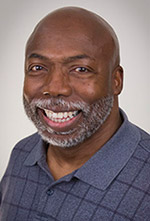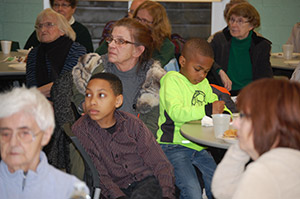While most of Wisconsin was preparing to watch the Green Bay Packers in the NFC Championship game on Sunday, Jan. 18, nearly 100 people at St. Eugene Parish, Fox Point, were tackling the topic of race and racism.
Leading the dialogue was University of Wisconsin-Milwaukee professor Gary Williams, founder and director for the Institute  Gary Williamsfor Intercultural Research and interim director of the Black Cultural Center at the university.
Gary Williamsfor Intercultural Research and interim director of the Black Cultural Center at the university.
“Race is here to stay and so is racism,” Williams said in opening the discussion. “It’s a chronic disease in America.”
The event was sponsored by the human concerns committee at the parish in hopes a civil dialogue, in the predominantly white community, would help people understand some of the problems and how to move toward fixing them.
“We, for the last 30 years in Milwaukee, have been ranked as one of the most segregated areas in the United States,” Williams said. “That’s residential segregation.”
Communities that are mostly one race, Williams said, have a tendency to allow for racist behavior, beliefs and stereotypes that go unchecked and are even passed on to younger generations.
“We have to reach out to each other,” he said. “The white community has to reach out to the black community. The black community has to reach out to the white community. And we have to do that in some collaborative fashion that allows us to develop solutions to these problems because we’re all a part of it.”
Williams thanked St. Eugene Parish for hosting the event and hopes this conversation can spread to surrounding communities. He advocated for those who attended to have this conversation with people that they know.
“Whatever you do, pull them out of their ignorance about the need to manage race and racism in America,” he said.
He brought up the marches taking place in cities like Milwaukee and New York City, protesting the deaths of unarmed black men.
“Did you observe the composition of those groups?” he asked the audience. “Very mixed … our young people are getting there. They realize they have to work across differences.”
In recent months, conversations about racism have, at times, turned into shouting matches with one side or another having  Judy Pasko listens to Gary Williams talk about racism at St. Eugene Parish, Fox Point. She brought two of her children, Cameron, left, and Darius, sitting on her lap, with her and said that they have been a gift to her other children who are white. (Catholic Herald photo by Ricardo Torres)to defend themselves or the actions of strangers. Williams said the language that is used needs to be as thoughtful as the solutions.
Judy Pasko listens to Gary Williams talk about racism at St. Eugene Parish, Fox Point. She brought two of her children, Cameron, left, and Darius, sitting on her lap, with her and said that they have been a gift to her other children who are white. (Catholic Herald photo by Ricardo Torres)to defend themselves or the actions of strangers. Williams said the language that is used needs to be as thoughtful as the solutions.
“Oftentimes, when we begin the discussion about race and racism, especially among European American folks, the hair on the back of their neck stands up,” he said. “They say, ‘Oh, they’re going to point to me. I’m the racist in the room’ … that’s not the kind of dialogue we want to have.”
Williams told the audience that racism is a social construct created in America with no basis in science.
“Much of what we see, the fallout of what we see, that we view as racism in America is the result of institutional policies and practices that existed long before you were born,” he said. “(It’s) entrenched in these institutions, and what happens to us when we enter the institution? We behave accordingly because it’s the expectation that you act in that fashion.”
Williams joked that the UWM semester hadn’t started, so he was not going to give a lecture. The event quickly moved to a dialogue with people standing and talking about the Dontre Hamilton case in which an African American man was killed by a Milwaukee police officer at Red Arrow Park last April, issues with education, the legal system, unemployment and families.
In the midst of the discussion an idea formed. Noting that the parish has a twinning relationsip with a parish in Africa, one woman suggested that a similar twinning relationship be formed with a church in the city of Milwaukee. Her suggestion was met with a spontaneous round of applause.
“That idea of partnering with another black parish is an excellent, excellent idea,” Williams said. “We do have solutions in this room and in our community.”
One of the people who spoke was Judy Pasko.
“I wonder how many of us here are so opposed to abortion because we’re Catholic; how many of those people who are opposed to abortion take foster children nobody wants or nobody can take care of?” Pasko said. “How many people who are so opposed to abortion vote no on social service programs that would help these hopeless, unwanted children?”
Pasko attended the program with her two of her children, Cameron and Darius, both black. One son is adopted and she’s a foster mother to the other.
“Having black children in our family has been a gift to my other children who are white and to my white family because now they are our brothers, and now we can not ignore racism,” Pasko said. “What we have, they have. And until we as Christians recognize every living person as brother and sister, there is no end to racism.”
Pasko said her children’s presence is a reminder to people that we are all equal.
“Years ago people told me that even if you don’t pay attention at Mass, if you go to church on Sunday and you park your car out there, everybody driving past sees a witness, all these people believing and worshipping God,” she said. “If I bring my black babies to a white party everybody there sees them and recognizes they are part of the community.”
Parishioner Carol Josten hopes this event will be a launching point for the parish and surrounding community to take more action to rid the area of racism.
“The topic ties in really well with Catholic social teaching and that’s what we as a parish are trying to really get into and learn more about,” Josten said. “Here we are in Milwaukee, which is a very racially divided city and that’s not as it should be, and this was an opportunity for us to look at it not just as a community but as a Catholic community.”
